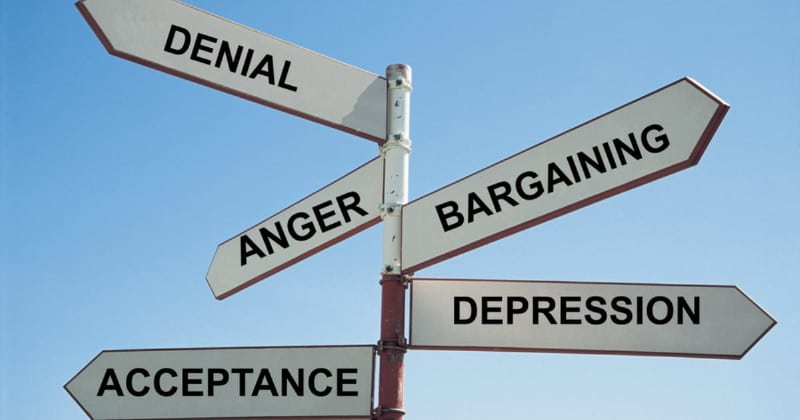Understanding the Many Stages of Grief
There’s no doubt everyone experienced grief differently. However, even without noticing, most people go through some stages of grief as they deal with the loss of a loved one. While there is no timeline as to when or how someone enters each of these stages of grief, acknowledging you’re experiencing them at one point or another can help you through the grief process.
Some people go through four stages, while others experience seven stages of grief. In any case, people experience them in any order and any number of times. It can become a revolving cycle that continues to change as the grieving process evolves.

The Five Stages of Grief
The most common stages of grief are referred to as the five stages of grief, proposed by Elisabeth Kübler-Ross back in 1969. In her book, On Death and Dying, she goes on to explain how we process the love of a family member, a friend, or even someone we admired.
Stage 1: Denial
“This can’t be happening.”
Often are our first words when we are faced with the fact that a loved one has passed. Denial is a common defense mechanism that we use to buffer the shock of the loss. It is a way to numb our emotions, and it is what helps us survive the news.
During the denial stage, we aren’t sure if life can go on, if we can move on, or if there’s any meaning in moving one. However, denial helps us pace our grief. It is the one thing that holds us together, allowing us to process only as much as we can handle.
Stage 2: Anger
“Why did this happen? Who to blame?”
As the sentiment of denial starts to fade away, reality begins to hit, and pain re-emerges, often in the form of anger. This is particularly common when the cause of death was not attributed to natural causes. At this stage, we’re still not ready to process our emotions, so we mask them with anger. This intense feeling can be aimed at objects, strangers, friends, or family members.
Even though we know the person who dies is not to blame, emotionally we resent them for causing us pain and leaving us. At the same time, we feel guilty for being angry, which in return makes us feel angrier.
Stage 3: Bargaining
“If only…” “What if…” “I will never…”
Once our anger has passed, feelings of vulnerability and helplessness start crippling in. As we fight to regain control of our lives and our emotions, we start bargaining. We start asking for a temporary truce that will somehow make everything go away:
- What if everything was just a dream?
- If only I could speak to them one more time.
- I will never be angry at my partner again.
Bargaining becomes our plea to find something that will make our feelings go away, that will help us feel normal. Guilt often accompanies bargain, as we start thinking there was something we could have done to save our loved one. We start thinking, “What if we sought another medical opinion,” “What if I stopped by that day,” “What if…”
Bargaining still protects us from the harsh reality of missing our loved ones. It’s our last effort to ask for a higher power to help us postpone what was inevitable and to help us find grief relief.
Stage 4: Depression
“I can’t bear this.”
Once we understand there’s nothing we can bargain that will bring back our loved ones, we enter a phase of depression. There are two types of depression associated with grief. The first one is in the form of regret and sadness. Here, we have a practical mindset and focus on the funeral, and burial arrangements as a way to avoid thinking of our deceased loved one. Those who experience this type of depression begin worrying about how their grieving process has affected those close to them.
The second type of depression during grief is more private, we become quieter, and tend to separate from reality. Depression becomes almost second nature after the loss of a loved one. Some might say depression, much as grief, never goes away it just continues to evolve as we move onto the next stages of grief.
Stage 5: Acceptance
“I’m saddened, but I can’t change it.”
Not everyone reaches the five stage of grief, acceptance of death is a powerful sentiment. It is courageous to give ourselves the opportunity to find peace. Recognition is a blend of periods of calmness, withdrawal, and a newfound style of happiness, marked by a sense of new beginning.
Acceptance is by no means a suggestion that you are impeding your loved one’s death, it is only a physical and emotional defense to imply that you have reached a new stage of normal. Acceptance, by no means, marks the end of grief. It just means one has found a place in which we can live again, while still mourning our loss, without limiting ourselves to stay still.
After acceptance, we’re ready to move. We’re prepared to embrace the memory and legacy of our loved ones as we continue to live.

Other Variations of the Stages of Grief
While the five stages of grief are the most well-known. Other models include related feelings and stages some people experience through their grieving process.
The 7 Stages of Grief
The seven stages of grief present a more in-depth approach to mourning. With two new stages, this grieving process contemplates emotions that can be very much related to the traditional five stages of grief. In this model, we see:
Stage 1: Shock – A feeling of being paralyzed and almost emotionless. Your body can’t find a way to process what just happened.
Stage 2: Denial – Once your body process the information, your mind decides not to believe it to protect you from grief.
Stage 3: Anger – When you finally realize the reality, a sentiment of anger towards your loved one, and sometimes yourself takes over.
Stage 4: Bargaining – As you seek a way to control your emotions, you begin asking for help from a higher power figure.
Stage 5: Testing – As you decide the time to move on, you begin trying solutions for coping with the loss and rebuilding your life back to normal.
Stage 6: Depression – Most of the time, testing takes you back to where you were before, leaving you in a state of depression as you can’t find a way to process your grief.
Stage 7: Acceptance – Those lucky enough to make peace with the loss of a loved one will experience acceptance and begin to rebuild their lives as they go.
The 4 Stages of Grief
Another way of looking at the stages of grief is through the ideas of John Bowlby, a British psychologist that worked with children experiencing attachment issues. His work focused only on four stages of grief:
Stage 1: Shock and Numbness – A mixed feeling of shock and denial as our body tries to process the information while it tells the mind that it can’t be happening.
Stage 2: Yearning and Searching – Once we’re aware of our loss, we start understanding that the future as we imagine is no longer a possibility. We start searching for that comfort and a way to feel the void our loved one left.
Stage 3: Despair and Disorganization – Even though we’ve finally accepted what happened, there is a feeling of hopelessness and despair that’s often accompanied by anger and disorganization. At this stage, we might withdraw from our social circle as we try to process our feelings.
Stage 4: Reorganization and Recovery – At this point, you believe you’re ready to establish a new daily routine, go back to day-to-day life, and develop new goals while facing the new reality of having lost a loved one. The recovery process might never end, but it can evolve as you continue to reorganize your feelings.
The Truth about Grief
In reality, the stages of grief are just guidance. The truth is that we all experience these stages at a different pace. Nothing is linear when it comes to grief, even though these stages are meant to be looked at as a process, they indeed are not.
Much as there is no typical loss, there is no typical grief. Grieving takes on many forms, stages, and feelings, as it is as individual and unique as we are.

How to Find Help When Grieving?
Seeking out help when grieving can help many of us healthily process our emotions. Eventually, the decision to look for help is very personal. However, as we’re navigating our grief, we might miss signs we need grief counseling. Being self-aware of these signs such as having trouble with day-to-day life, relying on substances to cope, and other alerting signs might prevent you from falling on a down-spiral void of grief.
Today, you can find grief support online through support forums, chat rooms, and other forms of online counseling. And you can also turn to websites for dealing with grief that provides a therapeutic outlet for you to understand your grieving process.
3 Thoughtful Ways to Help a Grieving Friend
Helping a grieving friend is not as easy as we think. Many times you might not know what to do or even what to say, which is why helping a grieving friend is complicated. At the same time, your friend is mourning the loss of a loved one. They’re still trying to process their emotions and thoughts.
However, here are three thoughtful ways you can help a grieving friend, without pushing them.
1. Be Present
Even if you don’t know what to say, or you don’t say anything at all, being present will show your friend that you care and you want to be there for them if they need you. Be mindful and give them their space, don’t try to dictate how they should be feeling or what they should be doing.
Let your friend be the one that expresses his feelings, and you listen and acknowledge their feelings.
2. Help Out at Home
As your friend process grief, they might have a difficult time going through day-to-day things such as cooking, cleaning, and picking up the kids. Enlist your help in as many chores as they feel comfortable delegating. Don’t be pushy about this either. If you’re at their home, try to help without even saying a thing, tidy up the place, or send them thoughtful gifts if you’re away.
3. Be Supportive
This goes without saying, but sometimes we don’t know how to be supportive when a friend is mourning. And that’s normal. As they navigate their grief stages, you can be there every step of the way to support their feelings, their actions, and their thoughts. Sometimes a friend is just looking for approval from a friend, and that’s where you come in.
Understanding the stages of grief is all about recognizing that we are all different, and even within the same family or relationships, grief can be different. If you’re grieving, seek out counseling, go through your grief stages at your own pace and your order. The important thing to remember is that there’s life after death, and even though it might take you some time to get there, eventually you will. Never lose hope.


